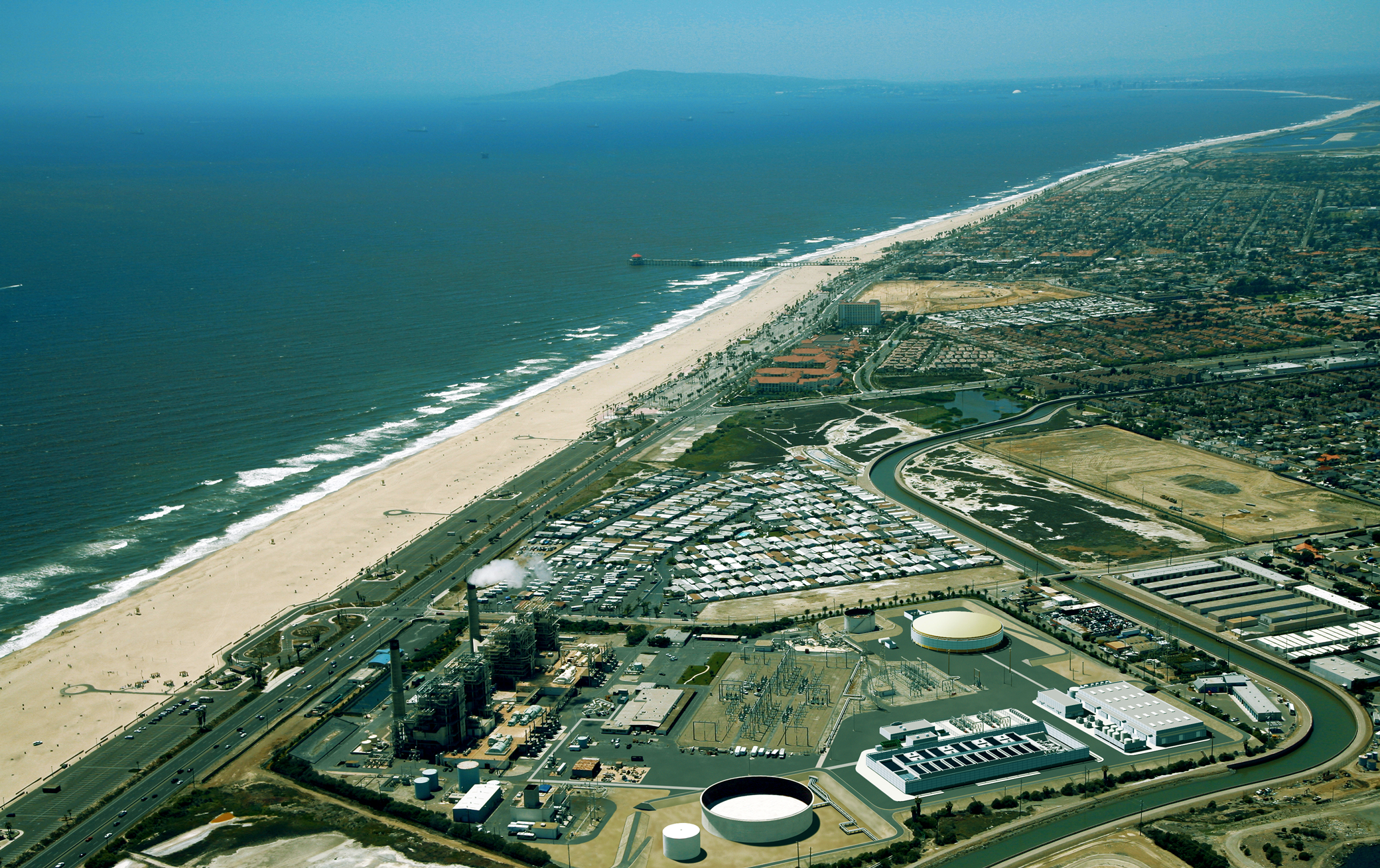17 years later, O.C. desalination plant inches toward finish line
The massive $1 billion Carlsbad desalination plant — the largest in North America — begins normal operations this month after a long legal and regulatory odyssey. The plant is expected to provide 54 million gallons of water a day, or about 7 percent of the county’s demand.
At an event held Monday at the oceanfront facility 30 miles north of San Diego, speakers praised the wisdom of the San Diego County Water Authority in teaming with project developer Poseidon Water in building the plant over the objections of the Metropolitan Water District of Southern California. They said the desal plant should inspire construction of similar facilities across drought-plagued California.
 But Poseidon’s bid to build a $900 million desal plant in Huntington Beach shows that the drought hasn’t necessarily changed anything in terms of making the legal and regulatory obstacle course easier to navigate. As the OC Weekly points out, Poseidon has been trying to secure support and approval for the Orange County project for at least as long as it pursued the Carlsbad project, first proposing a design for a desal plant there in 1998.
But Poseidon’s bid to build a $900 million desal plant in Huntington Beach shows that the drought hasn’t necessarily changed anything in terms of making the legal and regulatory obstacle course easier to navigate. As the OC Weekly points out, Poseidon has been trying to secure support and approval for the Orange County project for at least as long as it pursued the Carlsbad project, first proposing a design for a desal plant there in 1998.
How far have company officials gotten? An August story in the Orange County Register noted that there is not even established acceptance of the proposed location of the facility:
The push to look at other locations is reflective of a perception among anti-Poseidon activists that the company has foisted its project upon an unwitting public, that it’s proposing a plant no one asked for, and that the plant isn’t even needed in these times of conservation and water-use cutbacks. Recycling technologies are improving, they point out, and there’s talk of storing storm-water for later use as drinking water.
Poseidon has good reasons for locating its proposed plant near the AES power plant in Huntington Beach. There’s already an open ocean intake pipe at the location, a pipe used to bring in seawater to cool down the power plant.
Surfrider group: Orange County project ‘the worst offender’
While the California Coastal Commission ended up siding with Poseidon in approving the Carlsbad plant, it’s not clear if the commission is prepared to do the same with the Huntington Beach proposal. Environmentalists assert the desalination plant poses significant risks to offshore marine life in Orange County. The Surfrider Foundation’s Newport Beach chapter is leading the charge, calling the proposed project the most damaging yet proposed in California:
There are a number of desalination technologies, and if it is not done properly, the seawater intake process can unnecessarily kill marine life. Desalination also produces a highly concentrated brine discharge that degrades water quality and marine life habitat if not properly diluted. …
There are numerous ocean desalination facilities being proposed in California, all in various stages of planning or permitting. Many of the proposed facilities have not been designed to minimize degradation to marine habitats and water quality, nor are the proposals being thoroughly evaluated by any government agency for their cumulative impacts statewide. The California State Water Resources Control Board is currently in the process of collecting scientific data on the adverse impacts of ocean desalination, and how best to minimize those impacts. But some proposals are moving forward without having adopted the recommendations of the science community – Poseidon’s project proposal is the worst offender.
Nevertheless, the project has bipartisan political support, and has begun to make the sort of process gains that Poseidon did with its Carlsbad proposal several years ago. The Los Angeles Times has details:
In May, the board of the Orange County Water District approved a non-binding term sheet with Poseidon to negotiate the price of water from the plant and to determine who would be responsible for various aspects of the project.
[Poseidon Vice President Scott] Maloni said he expects the Orange County district to negotiate a 50-year deal with Poseidon should the project be approved by the California Coastal Commission sometime in the spring.
A key part of the term sheet is that Poseidon must prove to the Orange County district that the Carlsbad plant can operate without a hitch for 90 consecutive days.
“We’re probably a year away from executing a final water purchase agreement [with the Orange County Water District],” Maloni said. “Carlsbad would be in operation for a good amount of time.”
Chris Reed
Chris Reed is a regular contributor to Cal Watchdog. Reed is an editorial writer for U-T San Diego. Before joining the U-T in July 2005, he was the opinion-page columns editor and wrote the featured weekly Unspin column for The Orange County Register. Reed was on the national board of the Association of Opinion Page Editors from 2003-2005. From 2000 to 2005, Reed made more than 100 appearances as a featured news analyst on Los Angeles-area National Public Radio affiliate KPCC-FM. From 1990 to 1998, Reed was an editor, metro columnist and film critic at the Inland Valley Daily Bulletin in Ontario. Reed has a political science degree from the University of Hawaii (Hilo campus), where he edited the student newspaper, the Vulcan News, his senior year. He is on Twitter: @chrisreed99.
Related Articles
New regulation fights shadow lobbying
The state’s political watchdog agency unanimously approved a new regulation on Thursday making it harder for lobbyist groups to conceal




